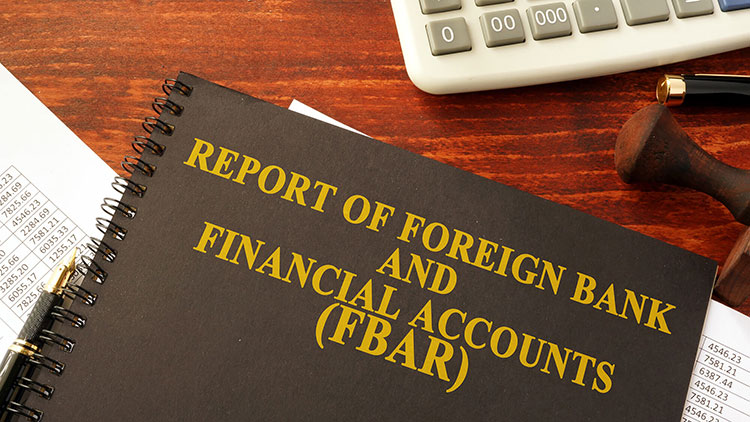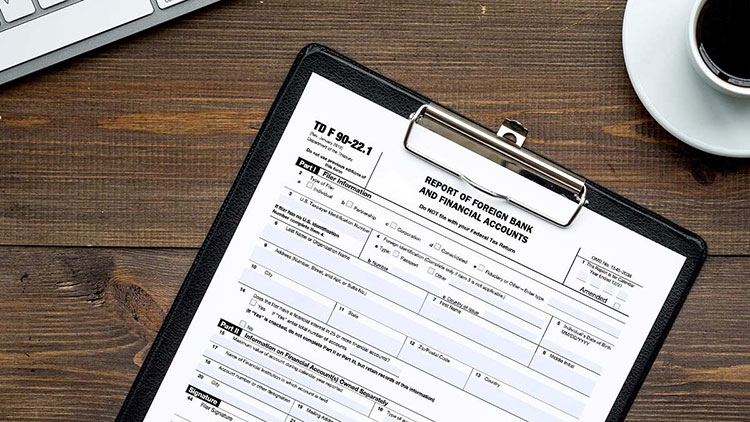
When starting a business in the U.S, acknowledging the country’s regulation in finance is of utmost importance to run your business smoothly.
As you need to have a foreign bank account and other financial accounts (investment, pension, brokerage, etc) to operate your company in the U.S, you must follow the FBAR, or Foreign Bank and Financial Accounts Reporting rule. It is a part of the U.S financial regulation to verify whether the money in your foreign financial account is legitimate.
Understanding the fundamental requirements of FBAR filing will help you have a clean tax season and avoid unwanted penalties from the U.S government if failing to file one.
Let’s have a glance at everything you need to know about FBAR with BBCIncorp including:
- What an FBAR is
- Who must file an FBAR
- When to file one
- What the penalties for not filing one
- How to correctly submit an FBAR
1. What is FBAR?

FBAR stands for Foreign Bank Account Report, which is also known as FinCEN form 114. It is used to report the amount of money and assets in a foreign financial account to the Internal Revenue Service (IRS) and the Financial Crimes Enforcement Network (FinCEN).
Why was FBAR formed? It was created as part of a U.S initiative to combat tax evasion, money laundering, and other financial fraud. In particular, individuals are required to report the amount of money and assets in their foreign financial accounts when exceeding the threshold proposed by the U.S Treasury. FBAR has been strictly enforced in recent years by the IRS to ensure the legitimacy of the money in overseas accounts.
2. Who must file an FBAR?
According to the IRS, those who must file an FBAR are:
- A U.S citizen or resident;
- An entity (corporation, limited liability company, partnership) legally formed under the laws of the United States;
- A trust legally formed under the laws of the United States;
- An estate legally formed under the laws of the United States.
The FBAR is used to report:
- A signature, a financial interest in, or different authority over at least on account placed outside the U.S;
- If the aggregate value of the foreign financial accounts surpassing $10,000 at any time in the calendar year reported.
Reminder
A foreign account is defined as an account at a financial institution placed outside the U.S. Whether the account produced taxable profits has no impact on whether or not the account is a “foreign financial account” for FBAR purposes.
3. When are you exempt from filing an FBAR?
As stated by the IRS, it is not mandatory to report foreign financial accounts that are:
- Correspondent/ Nostro debts;
- Maintained on a U.S military banking facility;
- Owned by a governmental entity;
- Owned by an international financial group or institution;
- Held in a retirement plan of which you’re a participant or beneficiary;
- Held in an individual retirement account (IRA) that you own or are beneficiary of;
- Part of a settlement of which you’re a beneficiary if a U.S. person (trust, trustee of the settlement, or agent of the settlement) files an FBAR reporting these accounts.
Furthermore, you don’t have to submit an FBAR for the calendar year if:
- All of your foreign financial accounts are said on a consolidated FBAR;
- All your foreign financial accounts are owned together with your spouse;
- You’ve completed and signed FinCEN Form 114a authorizing your spouse to report on your behalf, and your spouse reports the jointly-owned accounts on a timely-filed, signed FBAR.
Note
Income tax filing status, namely married-submitting-jointly and married-filing-separately, is not applied as a qualification for this exception.
4. What is the due date to file an FBAR?

Officially, you are required to file an FBAR earlier or on April 15th of the calendar year.
In case you fail to submit the FBAR by the due date of April 15th, you will be entitled to FBAR automatic filing extension to October 15th.
If you don’t file the FBAR by the extended due date, you will be subjected to a fine. However, the IRS will not penalize you for filing FBAR over the final due date if you can prove to the U.S Treasury that there was reasonable cause for the late submission. For instance, the IRS will further extend the due date for filing FBAR if you are affected by natural disasters.
5. What are the penalties for failing to report FBAR?

Failing to file an FBAR when required to do so means facing civil monetary penalties, or even criminal penalties based on how you violate it.
Here is the amount of penalty for each type of FBAR violation:
Negligent Violation
- Current maximum amount of penalty: $1,078
- Criminal Penalties: none
Non-Willful Violation
- Current maximum amount of penalty: $12,459 for each violation
- Criminal Penalties: none
Pattern Of Non-Negligent Violation
- Current maximum amount of penalty: Up to $83,864
- Criminal Penalties: none
Willful Violation – failure to file an FBAR or retain records of financial account
- Current maximum amount of penalty: $124,558, or 50% of the balance in the foreign account at the time of the violation
- Criminal Penalties: $250,000 or 5 years or both
Willful Violation – failure to file an FBAR or retain records of financial account while violating certain other laws
- Current maximum amount of penalty: $100,000, or 50% of the balance in the foreign account at the time of the violation
- Criminal Penalties: $500,000 maximum or 10 years or both
Willfully Filing False FBAR
- Current maximum amount of penalty: $100,000, or 50% of the balance in the foreign account at the time of the violation
- Criminal Penalties: $10,000 maximum or 5 years or both
6. What are the ways to file an FBAR?

Officially, you can submit your FBAR in two ways:
Electronic filing
Currently, individuals and business entities are required to submit the FBAR electronically via the Financial Crimes Enforcement Network’s BSA E-Filing System. It is the most convenient way to file your FBAR.
Paper filing
You can paper-file your FBAR if you want to. In that case, you ought to call the Financial Crime Enforcement Network (FinCEN) Regulatory Helpline to request an exemption from FBAR electronic submission. If your request is approved, FinCEN will send you the official paper FBAR form. You will then fill it and mail it to the IRS according to the address instructed in the form.
IRS does not accept paper-filings on TD F 90-22.1 (obsolete) or a printed FinCEN Form 114 (for electronic submission only).
In case you need a person to file your FBAR on your behalf, use FinCEN Report 114a (Record of Authorization to Electronically File FBARs) to authorize that person to do so. Remember, you don’t have to submit the FinCEN Report 114a when filing the FBAR. Just keep it as your records to present it to FinCEN or IRS upon request.
Reminder
It is essential to keep records for every account you file on the FBAR. Those records must comprise below details:
- The account’s name
- Account number
- Name and address of the overseas financial institution
- Type of account
- The maximum amount of money at the filing time of the year
Finally, you have to keep your FBAR records for 5 years from the due date of the FBAR.
Conclusion
When having a foreign bank account or other financial accounts to conduct your business in the U.S, make sure you are well aware of the FBAR regulation. It was set as an effort of the U.S government to supervise the money origin of foreign financial accounts, battle tax evasion, and prevent financial scams.
Following the FBAR requirements and submitting one on time will go a long way in helping you operate your business in the U.S with no trouble.
Should you have any questions about setting up a company, talk to our experts now!
Disclaimer
While BBCIncorp strives to make the information on this website as timely and accurate as possible, the information itself is for reference purposes only. BBCIncorp would like to inform readers that we make no representation or warranty, express or implied. Feel free to contact BCCIncorp’s customer services for advice on specific cases.
Get helpful tips and info from our newsletter!
Stay in the know and be empowered with our strategic how-tos, resources, and guidelines.

